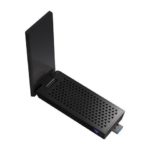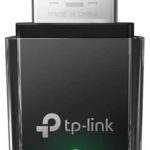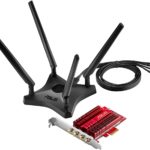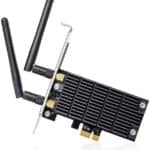Best WiFi Adapter For Gaming in 2022
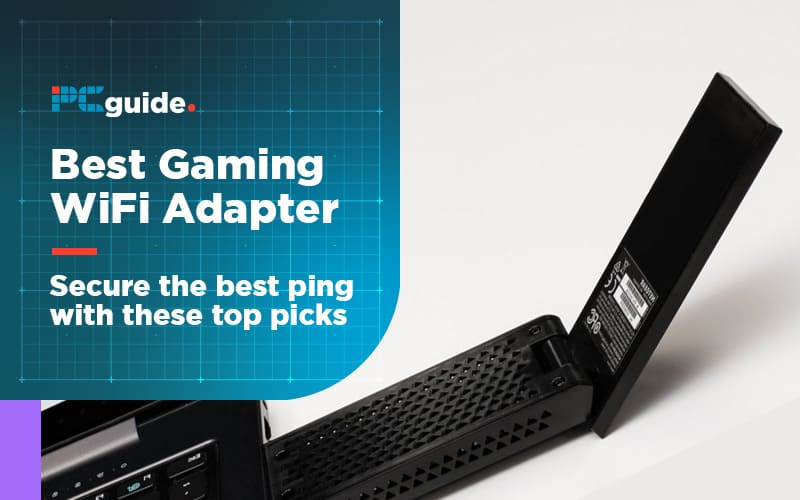
Multiplayer gaming has always been a big deal when it comes to PC gaming, from Unreal Tournament LAN parties to Call of Duty: Warzone, a reliable and past connection is key for all players.
There are two types of WiFi adapters, USB and PCIe. USB is the most user-friendly, providing a plug-and-play wireless solution that is ideal for laptops. PCIe plugs straight into a desktop motherboard like a graphics card would. This option normally provides faster connections from the WiFi device and is preferred by hardcore multiplayer enthusiasts.
In this article, we break down the best WiFi adapters for gaming so that you don’t have to, detailing a few different options for you to pick from. Whether you’re more into PCIe or the simplistic USB plug-and-play functionality, you should find the right one for your needs.
Products at a Glance
How We Picked Them
We looked at a few factors, most importantly providing a mix of budget and high-end adapters with options for both USB and PCIe connectivity. With gaming in mind, we’ve gone for adapters that focus on reliable connections that provide. Sometimes reliability comes before speed.
Best WiFi Adapter For Gaming in 2022
- Flexible antenna for better range
- Solid connection
- No detachable antenna
Covering a range of bands and featuring a sleek design with a docked option for better range, this adapter is a great mid-range option for PC gamers on the go or for desktop gamers who don’t want to mess around with PCIe. Its dual-band WiFi connection allows for up to 600 Mbps on 2.4GHz and 1300 Mbps on 5GHz and is backed up by four internal high gain antennas, making sure there are zero drop-outs during online play.
The Nighthawk utilizes USB 3.0 as its method of connectivity which 99.999% of you out there should have in your PC or laptop by now and if not, it could be time to do an upgrade. If you are on the more advanced USB-C and have no basic USB ports at your disposal though, you can slot it into a hub and it’ll still perform perfectly fine.
One of the best features of Nighthawk AC1900 is its dynamic QoS. It prioritizes internet bandwidth based on the application and device. So for example, your current game of Counter-Strike will take priority over your antivirus checking for updates. This is automatically carried out in the background which can really make a difference during peak times at home.
- Strong features for it's pricepoint
- Small profile
- Internal antenna limits range
Packing USB 3.0 and Dual Band 802.11ac connectivity for around $20 is a bargain. OK, it doesn’t have multiple high-gain antennas, but it’s a nice budget option for casual players.
Again, similar to the Nighthawk, this TP-Link WiFi adapter for gaming uses USB 3.0 tech. The reason why is because USB 3.0 is up to 10x faster than USB 2.0, making high transfer speeds much more achievable. This WiFi adapter is also backed up with MU-MIMO wireless connectivity for supported devices furthering its claim in this best WiFi adapters for gaming list.
Speaking of support, all Windows formats from XP to 10 work well with TP-Link 1300, not to mention Mac OS X. It’s 3dBi dual omni-directional internal antenna should make quick work of picking up strong signals also.
- Moveable quad antenna for maximum signal range
- Custom heatsink for peak performance
- Antenna fixture is magnetic and not ideal for non-metal surfaces
Entering the realm of PCIe WiFi adapters isn’t possible without mentioning ASUS. The AC3100 performs amazingly well on both 2.4Ghz and 5Ghz thanks to its fast PCIe connectivity direct to a desktop motherboard. Internal WiFi adapters are normally subject to temperature interference from other components, but the PCE-AC88 features a custom heatsink which keeps running temps low. This is fantastic for those that are gaming long into the night and will need a strong internet connection for multiplayer matches.
The flexible quad antennas are a welcome change from the fixed status quo, allowing users to find the optimal signal reception. Better still, it features a magnetic base which should latch onto most desktop cases for ease of use.
The AC3100 technology that goes into this WiFi adapter for gaming boasts up to 60% faster connection than the current WiFi 5 standard (802.11ac), making for smooth streaming and online gameplay.
While you might think that all these positives reflect in a higher price point, the ASUS comes in at more of a budget range, perfect for those that don’t want to spend hundreds of dollars on networking equipment.
- External/detachable dual antennas
- Low-profile bracket
- Data transfer is slightly lower than other PCIe WiFi adapters
Looking for an even more budget PCIe option? Surprise surprise, TP-Link has you covered.
The range isn’t the best, but it has a decent heatsink and provides solid connections in most environments. It also features two external antennas and a low profile card for those bulky desktop builds. The PCIe connection alongside its 802.11ac dual band support makes for a fast connection also.
TP-Link have focused on an easy install for users, simply plug in the AC1300 into a free PCIe slot on your desktop motherboard and it’s good to go. It runs on all usable versions of Windows from XP to 10, it’s dual antennas are sure to provide a solid connection for casual players.

Best WiFi Adapter For Gaming in 2022
Points To Consider
PCIe or USB?
PCIe products are for use in Desktop PCs (Known as towers) and will not be compatible with laptops. The general use is to buy PCIe options for desktops and USB options for laptops depending on the budget.
Do You Already Have WiFi Support?
Your device may already have WiFi support built-in. Especially when considering £1000 and over gaming laptops, the WiFi support may be better than any dongle. Make sure to go into system settings then device management to see what WiFi support you currently have before upgrading or introducing WiFi support.
What’s The Difference Between 2.5Ghz and 5Ghz?
2.5Ghz provides a wider/longer WiFi range with slower speeds, whilst 5Ghz provides faster speeds with a shorter range. Most modern devices and internet provider routers support both, so there’s nothing to worry about here.
What is QoS?
QoS stands for Quality of Service. It prioritises internet bandwidth based on the application and device. So for example, your current game of Counter Strike will take priority over your antivirus checking for updates. This is automatically carried out in the background which can really make a difference during peak times at home.
Is Beamforming Important?
Beamforming is when a WiFi connection is concentrated to a single point, rather than producing a wider signal. Imagine a hose nozzle being switched to stream instead of spray. All 802.11ac devices are capable of beamforming but do not need to include it as standard. Most products make a point of being beamforming compatible.
Is USB 3.0 Better and USB 2.0?
USB 3.0 Is up to 10x faster than USB 2.0. However, both the adapter and desktop/PC must have USB 3.0 ports to take advantage of this speed.
What Does Wireless Banding Type Mean?
802.11 is the radio frequency transmitted at, the term dual band represents the 2.5Ghz and 5Ghz frequency bands 802.11 is capable of. The G and AC at the end represents the linkrate (internet speed). For example, 802.11ac is capable of over 6000mb/s.
What Does MU-MIMO do?
MU-MIMO stands for multi-user, multiple input, multiple output. It’s for multiple users trying to connect to one router at the same time. To take advantage of this, a user’s router must also have this feature
Our Verdict
As the old saying goes, you get what you pay for. Yes, there is a big price difference in the WiFi adapters for gaming in this article, but their features are based on said price and the needs of the person using them. If a gaming athlete is looking at a solid connection for their Call of Duty: Cold War ranked matches, for example, it’s absolutely worth paying the extra. Additionally, casual/light players may want to opt for the budget option.
If we were to choose the absolute best WiFi adapter for gaming though, we’d suggest picking up the Netgear Nighthawk. It has everything a gaming enthusiast needs when it comes to securing a stable wireless connection while also having the plug-and-play functionality of USB. Yes, it might be a little more expensive, but it’s worth the extra, knowing you’ll never have connection drops.


